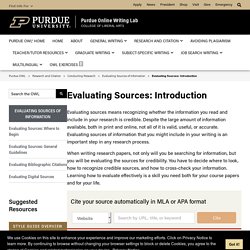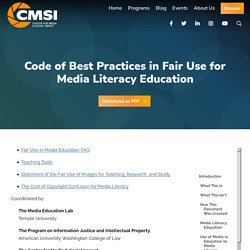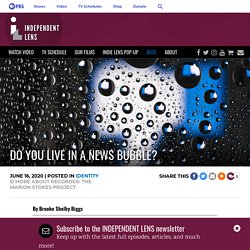

BOOK: Fact vs. Fiction Teaching Critical Thinking Skills in the Age of Fake News. PODCAST: On The Media: Listen. VIDEO: How Does "Fake" News Become News? VIDEO: Eli Pariser: Beware Online "Filter Bubbles". VIDEO: How false news can spread - Noah Tavlin. VIDEO: Live My Digital for students: Digital Footprint. VIDEO: Safe Web Surfing: Top Tips for Kids and Teens Online.
BOOK: Fighting Fake News!: Teaching Critical Thinking and Media Literacy in a Digital Age. BOOK: Information Literacy in the Digital Age. Snopes.com. All Sides. PolitiFact. FactCheck.org. OWL Purdue: Evaluating Sources. This page is brought to you by the OWL at Purdue University.

When printing this page, you must include the entire legal notice. Copyright ©1995-2018 by The Writing Lab & The OWL at Purdue and Purdue University. National Council for the Social Studies. Let's Stop Using The Term "Fake News" - A FREE Media Literacy Vocabulary Activity. Logical fallacies, Rhetoric, Critical thinking. Center for Media and Social Impact: Code of Best Practices in Fair Use for Media Literacy Education. Introduction What This Is This document is a code of best practices that helps educators using media literacy concepts and techniques to interpret the copyright doctrine of fair use.

Fair use is the right to use copyrighted material without permission or payment under some circumstances—especially when the cultural or social benefits of the use are predominant. Digital Citizenship Curriculum - Common Sense Media. Fight The Fake: How does your source stack up? Media Literacy Resources. AllSides: Balanced news. PolitiFact. News Literacy Project.
PBS: Do You Live in a News Bubble? By Brooke Shelby Biggs Whether you think of her as a visionary or a kook, Marion Stokes was far ahead of her time in addressing a problem in American media that continues to this day: a lack of diversity among the gatekeepers of traditional media.

When she confronted white male panelists on the Philadelphia local public affairs program Input about the ways in which they systematically kept the voices of women and people of color out of the conversation and away from the levers of control, she might well have been addressing the media of 2020. MediaWise: How to sort fact from fiction online.
Project Look Sharp. Media Literacy - Northern State University. Common Sense: News and Media Literacy Parent Concern.